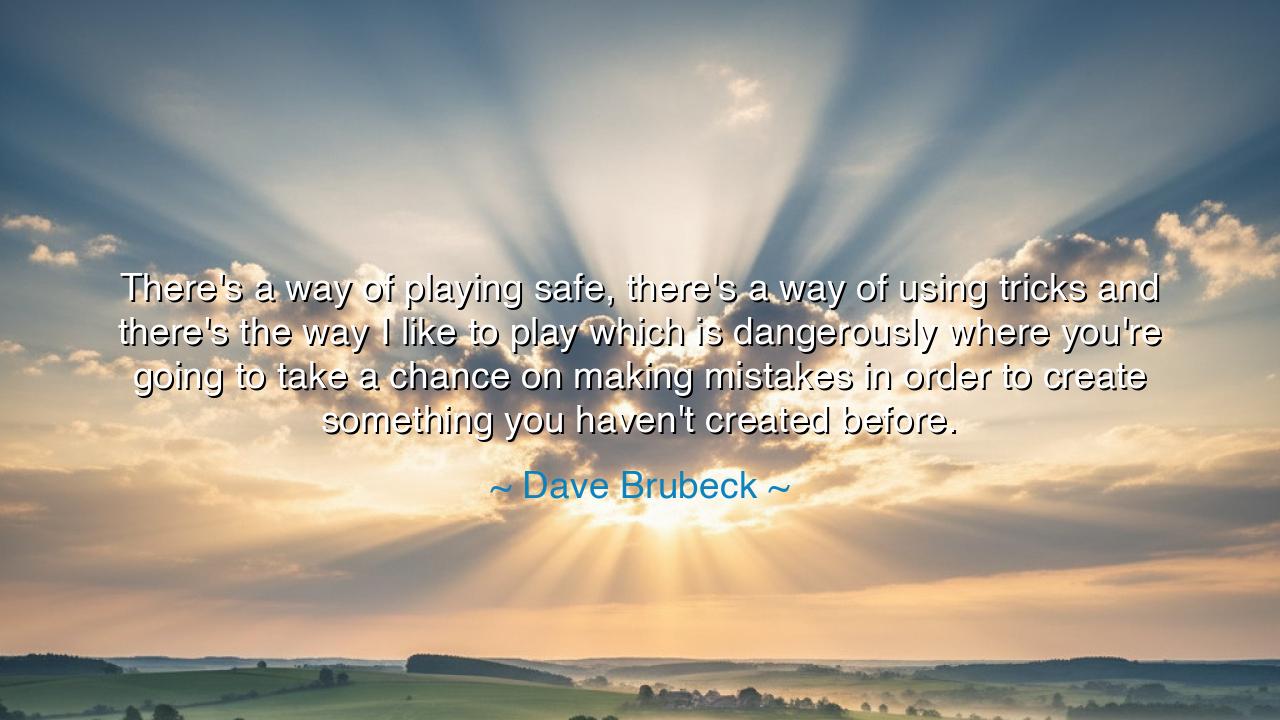
There's a way of playing safe, there's a way of using tricks and
There's a way of playing safe, there's a way of using tricks and there's the way I like to play which is dangerously where you're going to take a chance on making mistakes in order to create something you haven't created before.






In the ancient pursuit of mastery, the greatest artists, warriors, and philosophers alike understood a profound truth: there are those who play it safe, those who rely on tricks, and those who walk the path of dangerous creativity, willing to risk failure in order to create something new. Dave Brubeck's words resonate deeply with the soul of the artist, for they call us to embrace the unknown, to venture beyond the realm of certainty, and to challenge ourselves in the pursuit of true innovation. “There’s a way of playing safe, there’s a way of using tricks, and there’s the way I like to play, which is dangerously—where you’re going to take a chance on making mistakes in order to create something you haven’t created before.”
Throughout history, the greatest achievements have been born from this very spirit of boldness and risk. Consider the ancient Greeks, who established the foundations of philosophy, mathematics, and the arts. Figures like Pythagoras and Plato dared to venture beyond the accepted knowledge of their time, not to play it safe or follow old formulas, but to create entirely new worlds of thought. They took chances on the unknown, faced ridicule, and made mistakes along the way, but through those risks, they discovered truths that shaped civilizations. The very act of questioning the status quo and daring to make mistakes was their path to greatness.
The same can be said for the legendary Leonardo da Vinci, who, in his quest for artistic and scientific innovation, constantly pushed the boundaries of what was possible. His work in both art and engineering was filled with trial and error. Da Vinci was not afraid to make mistakes because he knew that each mistake brought him closer to the truth. His famous notebooks are filled with sketches of failed inventions, yet these very failures were steps toward the masterpieces he would later create. Da Vinci's willingness to venture into the unknown exemplifies the very essence of Brubeck’s philosophy: only by risking mistakes can we uncover new realms of creativity.
In the world of music, Brubeck himself embodied this spirit of adventurous creativity. The very nature of jazz is rooted in improvisation, where each performance is an act of risk—a moment where mistakes may occur, but where they can also give birth to something uniquely beautiful. Brubeck, like other great jazz musicians, did not settle for the safe route of repetition. Instead, he embraced spontaneity and the tension of unknowns in every performance. His willingness to experiment with time signatures and unorthodox rhythms, often pushing the limits of conventional structure, made him a pioneering figure in the music world. For Brubeck, the chance of failure was simply part of the journey toward creating something original.
This principle extends far beyond the realm of the arts. In ancient China, the great strategist Sun Tzu understood that victory in battle did not come from following a safe, predictable path, but from embracing uncertainty and innovation. “Opportunities multiply as they are seized,” he wrote, recognizing that only those who dare to take chances, those who push beyond the boundaries of tradition, find success. Similarly, Alexander the Great did not conquer the known world by relying on safe tactics. He took daring risks—crossing vast deserts, navigating uncharted territories, and facing overwhelming odds—because he believed that only through such boldness could he achieve greatness.
In the modern world, this lesson remains just as vital. Entrepreneurs, scientists, and innovators often find themselves on the edge of failure, not because they are reckless, but because they understand that true progress comes from stepping into the unknown. The greatest inventions of our time, from the light bulb to the internet, were created by those who were unafraid to make mistakes. Thomas Edison famously said, “I have not failed. I’ve just found 10,000 ways that won’t work.” His perseverance and willingness to fail led to unprecedented discoveries.
Thus, Brubeck’s message is not just about music or art; it is about life itself. We must not shy away from mistakes, but rather embrace them as part of the creative process. Whether in our careers, relationships, or personal growth, the only way to create something new is to take chances, to step beyond the safe paths, and to risk the possibility of failure. True innovation arises not from perfect execution but from the courage to make mistakes and learn from them. Let us remember that in the dance of life, it is not the safe steps that define us, but the bold ones, the chances we take, and the mistakes we embrace on our way to greatness.






AAdministratorAdministrator
Welcome, honored guests. Please leave a comment, we will respond soon